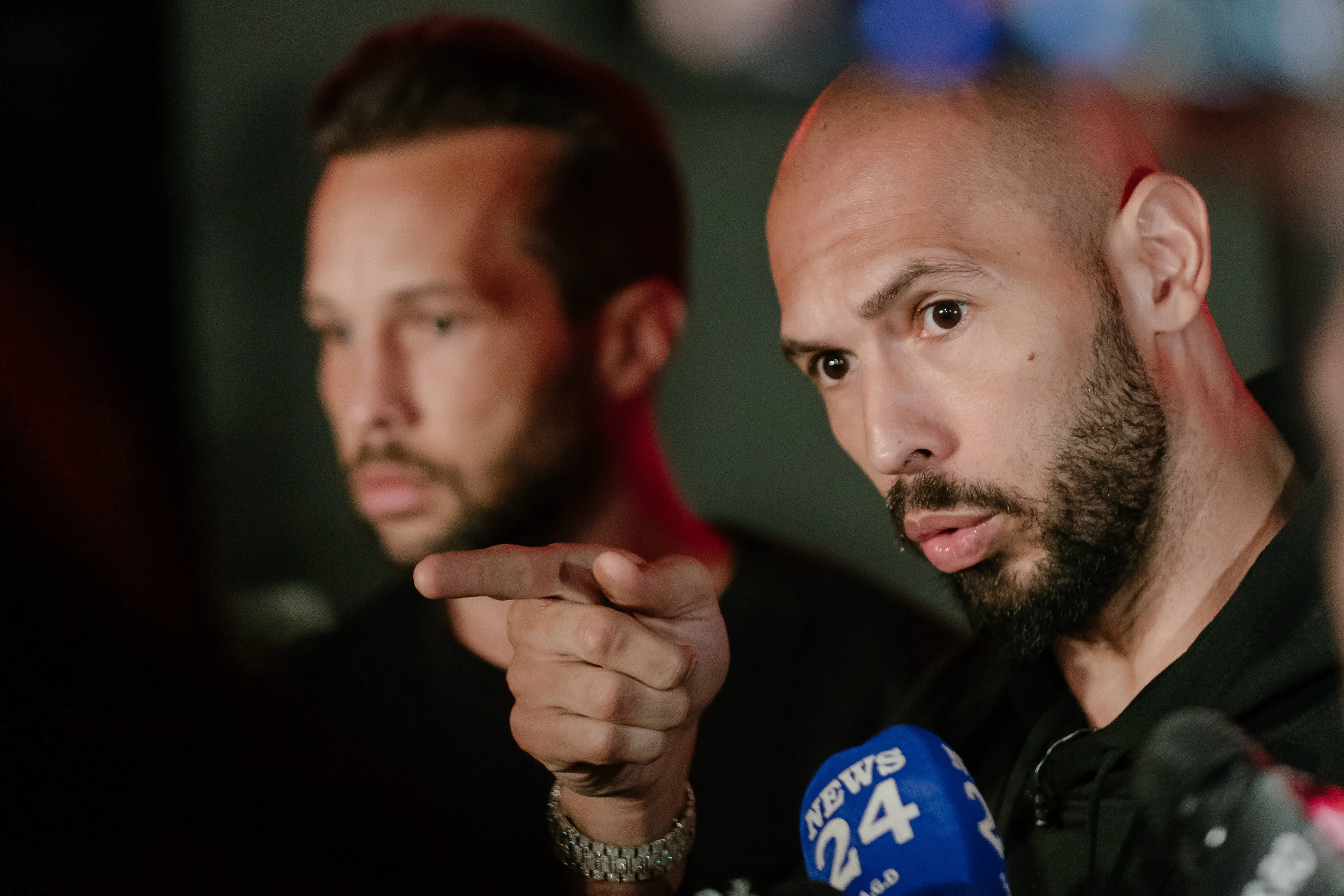Why was Andrew Tate banned from YouTube? Complete drama explained
-
 BUCHAREST, ROMANIA - MARCH 23: Andrew Tate and his brother Tristan Tate talk to the media outside their residence on March 23, 2025 in Bucharest, Romania. Andrew Tate and his brother Tristan had flown to the United States last month from Romania, where they have been charged with rape, having sex with a minor, human trafficking and money laundering, charges which they deny. Their bail conditions stipulated that they had to return to Romania by March 23. (Photo by Andrei Pungovschi/Getty Images)
BUCHAREST, ROMANIA - MARCH 23: Andrew Tate and his brother Tristan Tate talk to the media outside their residence on March 23, 2025 in Bucharest, Romania. Andrew Tate and his brother Tristan had flown to the United States last month from Romania, where they have been charged with rape, having sex with a minor, human trafficking and money laundering, charges which they deny. Their bail conditions stipulated that they had to return to Romania by March 23. (Photo by Andrei Pungovschi/Getty Images)In a wild turn, Andrew Tate's short return to YouTube didn't last; the well-known web figure got his channel banned again just one hour after it was unbanned. This quick change has made waves in the digital media fraternity, reigniting debates about platform moderation, free speech, and the boundaries of acceptable online discourse.
In August 2022, Andrew Tate was banned from YouTube. He broke a lot of rules, mostly for hate talk and misogyny. YouTube deleted his channel, which more than 700,000 people followed, because his videos were found to attack or threaten certain people and groups.
Tate's videos often pushed ideas of toxic masculinity. Other social media giants such as Facebook, Instagram, and TikTok also blocked him for saying such hateful stuff. YouTube made this choice after the efforts of Andrew Tate and his $49-a month program meant to show young boys how to get rich.
According to critics addressing Vice, the game takes advantage of young fans by cashing in on their passion and hard work, often being drawn in with social media ads. Although these platforms, such as YouTube, TikTok, and Instagram, previously promised to block such content, the programme continued, raising questions about the credibility of moderation policies.
A YouTube representative stated that the channels were now blocked due to a breach of its Terms of Service, namely the prohibition on prominently featuring content by users who had been terminated in the past.
Despite the ban, reportedly, videos featuring Tate's content continued to circulate on YouTube through fan uploads or guest appearances, sometimes attracting advertisements from major brands, raising concerns about the platform's enforcement of hate speech policies. The case has led to continued discussions of the efficiency of content moderation and the role that social media firms have in controlling harmful content.
Andrew Tate's YouTube channel, unbanned, then banned again, faces new restrictions
Internet personality Andrew Tate, once deplatformed due to his alleged hate speech, appears to be facing renewed restrictions on YouTube. Tate posted a video to his X (formerly Twitter) handle earlier today, and he captioned it as :
But just a few hours later, users started complaining that the channel was not available again, and YouTube started showing a message that the channel was no longer available. The event has sparked new online discussions regarding how platforms are moderated, what the limits of free expression are, and how the digital presence of Tate continues to be controversial.
After the recent deplatforming wave, Andrew Tate reappeared on the internet to comment on the matter and framed himself as a stable advocate of free speech. He pointed out that people who do not give in to their beliefs or pursue wealth are frequently prohibited indefinitely, and some removal by the mainstream platform has been turned into a sign of legitimacy to him and others who hold his views.
This view pops up as people talk a lot about how to weigh what can stay on sites and what must go, and the right to say what one thinks. Tate sees these limits not as roadblocks, but as proof that he sticks firm to his views and feelings.
Andrew Tate posted:
"You can tell who the true freedom fighters are, those who never take the shekels. They stay banned."
What do the netizens say?
As soon as the news went viral, netizens were buzzing. Here are some fans' reactions:
"The true freedom fighter speaks for the unheard and the powerless, standing against dominant and repressive powers, even when it costs them their reputation, their wealth, and their life," a user commented.
"They officially deplatformed him for hate speech but still profit from the millions of views his misogyny gets on countless fan channels. It’s profitable plausible deniability," another user commented.
"And he was thankging youtube just 5 mins ago. Stick with rumble bro youtube sucks," another netizen expressed.
"Mr. Cobra should get the Guinness World record," a netizen remarked.
"banned is the new verified," a user wrote.
Keep reading PRIMETIMER for more informative content!
TOPICS: Andrew Tate
- Why does Chase DeMoor want to make Andrew Tate "pay" in their upcoming fight?
- Andrew Tate to step into the ring for the first time against Chase DeMoor at Misfits 23
- Andrew Tate touts Charlie Kirk's memorial as "amazing" but wonders, "Do we have America back?"
- "Theyre coming for the rest of us" - Andrew Tate warns of a mysterious hit list after Charlie Kirk's assassination